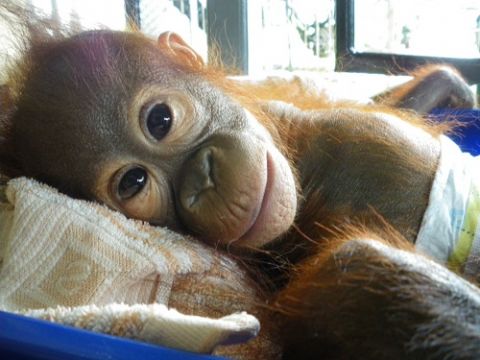
 A female baby orangutan is the latest arrival at IAR’s emergency rescue centre in Ketapang. She was brought in by members of the forestry department who told IAR’s team that local people from Desa Matan Jaja, a village in Dusun Pihik, had just given the orangutan to Pt Cipta Usana Sejati, a palm oil company.
A female baby orangutan is the latest arrival at IAR’s emergency rescue centre in Ketapang. She was brought in by members of the forestry department who told IAR’s team that local people from Desa Matan Jaja, a village in Dusun Pihik, had just given the orangutan to Pt Cipta Usana Sejati, a palm oil company.
The area of PT CUS state and the surroundings which contain a large population of orangutans have been vastly deforested for conversion into palm monoculture. This has had a huge impact on the orangutan population in the area and it is a wonder that more baby orangutans haven’t been found there. The official version the villagers gave was that the baby had fallen from a tree they were cutting down. They also said the mother had abandoned the baby and run away when the tree fell. However the little orangutan looked as though she had been away from the forest for quite a while: her skin was soft - very different from the hard dark skin orangutans usually have when they come from the forest. Even after some weeks this skin starts to peel and fall off, leaving soft skin underneath. Moreover, it is well known that the mothers don’t abandon their infants, even if they have to die to protect them. Therefore, it is most likely that the real story was quite different.
 The orangutan has been named Rahayu, which means “safe” in Javanese , the local language from Java. She already has all the teeth that an orangutan of more than one year old would usually have. However her weight is just 4.3 kilograms and she is very small. Rahayu was in very poor condition when she arrived. She was dehydrated, with a high fever and seemed to be blind as she had no blink reflex and did not follow food with her eyes. Unfortunately the blood test has shown positive for Plasmodium falciparum or knowlesi, both very severe malaria species which can be fatal. The vets Anita and Jenny, who are caring for her round the clock, have also noted that she presents nistagmus (rapid and uncontrollable movement of the eyes) and has neurological fits. These symptoms correspond to cerebral malaria which, as the name says, is a form of malaria that affects the brain and so causes neurological symptoms. This is a serious disease and the life of this poor baby really hangs in the balance.
The orangutan has been named Rahayu, which means “safe” in Javanese , the local language from Java. She already has all the teeth that an orangutan of more than one year old would usually have. However her weight is just 4.3 kilograms and she is very small. Rahayu was in very poor condition when she arrived. She was dehydrated, with a high fever and seemed to be blind as she had no blink reflex and did not follow food with her eyes. Unfortunately the blood test has shown positive for Plasmodium falciparum or knowlesi, both very severe malaria species which can be fatal. The vets Anita and Jenny, who are caring for her round the clock, have also noted that she presents nistagmus (rapid and uncontrollable movement of the eyes) and has neurological fits. These symptoms correspond to cerebral malaria which, as the name says, is a form of malaria that affects the brain and so causes neurological symptoms. This is a serious disease and the life of this poor baby really hangs in the balance.
For the treatment of the disease the vets urgently needed some Artemisin derivative medicines like Artesunate or Artemether, neither of which is available in any hospital or pharmacy in Ketapang. IAR’s team quickly called Nyaru Menteng, a centre run by the Borneo Orangutan Survival foundation. They had a stock of Artemether and were happy to help this orangutan. However, sending the medicine from Palangkaraya to Ketapang was likely to take several days. The second option was to ask Dr Kinari from Health and Harmony, who has a clinic in Sukadana, for some of these medicines. She was kind enough to want to help and so that same day the team went to Sukadana, two hours from Ketapang, to pick up the medicine.
After the new medicine was given to Rahayu, she improved noticeably. She seemed more hydrated once she was getting intravenous fluids and became more active. She started to eat well and showed that she has a good appetite. She also started drinking a lot and urinating well. However, it is still too early to guarantee that she will be ok – or even to know whether she will survive. The vets and keepers will continue to do the best they can for her so that she has every chance of a better future.

